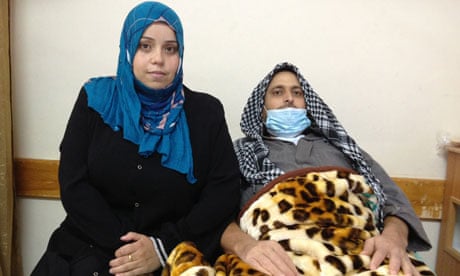A team of British surgeons has carried out Gaza's first organ transplants as a pilot for a long-term plan to train local medical staff to perform the operations.
Two patients underwent kidney transplants at the Shifa, Gaza's biggest public hospital, which is beset by overcrowding, chronic power cuts and shortages of drugs and equipment. The operations were conducted a fortnight ago by a volunteer medical team from the Royal Liverpool hospital.
"I cannot express my happiness," said Ziad Matouk, 42, who was born with one kidney and was diagnosed with renal failure several years ago. "I'm proud to have had one of the first transplant operations in Gaza. I want to hug and kiss all the doctors."
Matouk, whose wife donated one of her kidneys, hopes to return to his job as a falafel vendor in Maghazi refugee camp, central Gaza, within six months. The couple had sought a transplant in Cairo, but were rejected as unsuitable at a state hospital and could not afford the fee at a private hospital. "We were desperate," said Matouk.
The UK-Gaza link-up began about a year ago after Abdelkader Hammad, a doctor at the Royal Liverpool hospital, was contacted by an anaesthetist at the Shifa, who outlined the difficulties the Gaza hospital was facing with dialysis. The Shifa is forced to rely on generators because of daily power cuts; spare parts for its ageing dialysis machines have been difficult to import; and supplies of consumables, such as blood lines, filters and saline, are often scarce. Israel heavily restricted imports to Gaza between 2007 and 2010, and continues to control the flow of goods in and out of the Palestinian enclave.
About 500 patients, including 40 children, need dialysis two or three times a week, according to the Shifa.
After an exploratory trip last April, Hammad – whose family is Palestinian – and three colleagues from Liverpool arrived in Gaza via Egypt last month, bringing specialist equipment.
Two patients were selected for surgery. The first, Mohammed Duhair, 42, received a kidney donated by his younger brother in a six-hour operation. He was anxious about the surgery, but was reassured after talking to the British team. "I hope my life will now be normal," said Duhair, himself a family doctor in Rafah.
Two days later, Matouk underwent a transplant after his wife, Nadia, 36, was found to be a good match. She said it was her "fate and destiny" to donate a kidney to her husband of 20 years.
The surgery was carried out by the British team, assisted by doctors and nurses from the Shifa. "We are very satisfied with the results," said Sobhi Skaik, head of surgery at the Gaza hospital. "For the patients, it means that their lives are no longer dependent on machines. Both the surgeons and the patients' families are very happy."
Skaik hopes that Gaza medical teams will eventually carry out kidney transplants independently, and that other organ transplants may follow. The Shifa is working with the Gaza ministry of health on a plan to train its doctors, surgeons, nursing staff and laboratory technicians in transplant surgery at the Royal Liverpool.
"Funding is a problem," said Hammad. "In the meantime we will go back as volunteers to Gaza for the next couple of years to do more transplants." The Liverpool team's next visit is scheduled for May.
For Hammad, the visit to Gaza had an emotional as well as professional dimension. His Palestinian family was originally from Jaffa, now part of Israel, but became refugees in the 1948 war. Hammad was born in Iraq and lived in Jordan before moving to the UK 25 years ago. His visit to Gaza last April was the first time he had stepped foot on Palestinian soil.
"There are many problems in Gaza – power cuts, shortages of medication. People there can't make choices the same way that people can elsewhere," he said. "It was emotional for me to be able to help the people in Gaza and make life a little bit better for them. I felt proud."
